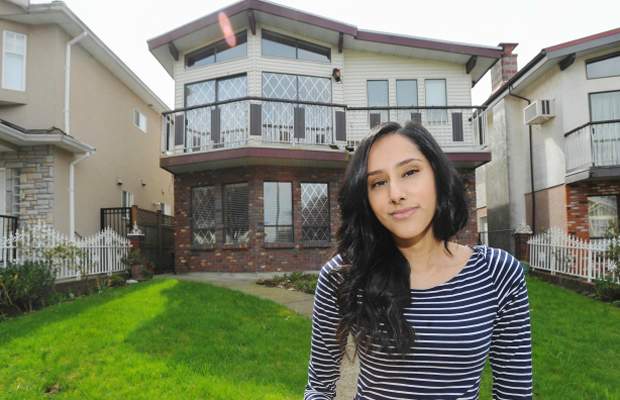
Back when blogging was a novelty, the ultimate insult to throw at someone was to say the author was a loser who still lived in his or her parents’ basement.
The assumption being, if you’re 20 or older and not in school and you still live with your parents, you are one big nerd.
But that stigma no longer applies as more and more twentysomethings remain at home for various reasons.
Recent statistics show almost half Metro Vancouverites in their 20s still live at home, the second highest rate in Canada.
You can understand that, given the exorbitant cost of real estate and high rents.
And cultural factors come into play, too, in Metro Vancouver’s multi-ethnic mosaic.
Then there are factors that affect all young adults: Difficulty getting an entry-level job; the need for more education in a knowledge-based world; women putting career ahead of motherhood; and couples less likely to marry until their 30s.
“It’s a lot more practical economically to share your costs with your parents,” said Barbara Mitchell, a professor of sociology and gerontology at Simon Fraser University. “Definitely, there used to be a stigma. I think there is still some stigma if you’re a man and you’re over 30 years old, say.
“But as young people see their peers stay home longer and delaying family formation, it becomes more of a lifestyle choice and the stigma disappears.”
The term many psychologists and sociologists use to describe people in their 20s now is “emerging adult.”
That meshes with studies showing that a human brain doesn’t quit growing, isn’t fully hardwired, until about age 25.
It might seem odd to suddenly invent a new stage of life, between adolescence and adulthood, but the entire concept of adolescence was only defined a century ago.
Consider our whole understanding of what it means to come of age, how we define when to thrust adult responsibilities upon our up-and-comers. In B.C., you need to be 17 years old to drive on your own; to vote, you need to be 18; to drink, 19; to rent a car, 21 and pay a hefty premium; to rent as a fullfledged adult, 25 years old.
Another thing to consider: Back in the day, when their Boomer grandparents were in their 20s, a simple Bachelor’s degree pretty well guaranteed you a good-paying job.
By the late 1980s, it required a Master’s. Now, even a Doctorate is no guarantee of gainful employment. “Getting entry-level career jobs has become really challenging, especially for young people fresh off the block with a degree or diploma,” said SFU’s Mitchell, author of two authoritative books on families and “boomerangs,” the 33 per cent of Canadian twentysomethings who left home then returned.
Rajveer Chohan is 24 and lives at home with her parents in East Vancouver.
A big reason is cultural.
“There isn’t any reason to leave, either,” she said, adding practicality to the equation. “I get a roof over my head, free meals and time with my family.”
Chohan has a degree in broadcasting from BCIT, which hasn’t translated into paycheques.
Radio is notoriously low-paying to begin with, but outside of a couple of work-for-free internships and one stint as a paid employee at a radio station, she hasn’t been able to break into the market.
“But even with that full-time paying job, I was living paycheque-to-paycheque because the wage was not amazing and rents are so high,” she said. Or take Shayla Fraser.
Like Chohan, she grew up in Metro Vancouver and she wants to stay.
She lived in Squamish with a boyfriend for a time, paying $750 a month for rent – bedroom, den, huge patio – but she’s back in North Vancouver living with her parents, scouring the classifieds and disappointedly discovering that to afford a place of her own, she would have to move to Langley or Cloverdale – the commuting costs to get to her job at a Fiat dealership in East Vancouver would negate most of the living expenses she’d save.
“My parents understand it, they know how expensive it is out there,” she said.
“But I’m 25 years old, I need to get out of there and on my own, into the real world.
“I hope by the summer sometime I can do it. My parents probably would appreciate if I did it sooner.”
Every young person, since the medieval guild-system, in which if your dad was a blacksmith you became a blacksmith, has had the same Catch-22: You can’t get a job without experience, you can’t get experience without a job.
But today, things are more complicated than ever, and that’s not even considering the dead weight of student debt that grads face today.
There’s the disappearance of blue-collar jobs, the extinction of white-collar jobs, both victims of technology.
There’s the fact there is no longer a mandatory retirement age, that people are living longer, too, and still taking up job spaces.
Add global warming, acidic oceans and the renewed threat that nuclear powers are angry with each other again, and things can look pretty grim for a young adult.
“But it’s not all doom and gloom,” SFU’s Mitchell said. “Every generation has its challenges.”
Transition to adulthood
Here are the five stages generally agreed upon by social scientists of transition to adulthood:
1. Finishing school
2. Leaving home
3. Gaining financial independence
4. Getting married
5. Having children
In a 1960 U.S. study, which roughly mirrors Canadian trends, 77 per cent of women and 65 per cent of men had attained all five milestones by the time they were 30. By 2000, it was 50 per cent of women and 35 per cent of men.
A similar Canadian study found that in 1970, young adults hit comparable milestones by an average age of 25; by the 2000s, the average age had moved into the low 30s.
How to cope with your adult child at home
Vancouver freelance writer Christina Newbury, having twice returned to her parents’ place to live, has a self-help book for parents with boomerang kids called The Hands-On Guide to Surviving Adult Children Living at Home.
“While it’s nice to think families with adult children living at home can always get along like they do on TV, the fact is having adult children return home can put a lot of stress on you and your partner,” she said.
Her book includes strategies for:
– Recognizing the difference between constructive support and dangerous support that can do harm
– Treating adult kids who return home differently than before they left
– Establishing privacy rules for both parties
– Delegating which chores your grown kids are responsible for
– Charging them rent and getting them back on their feet
– Spelling things out in a contract




Join The Discussion